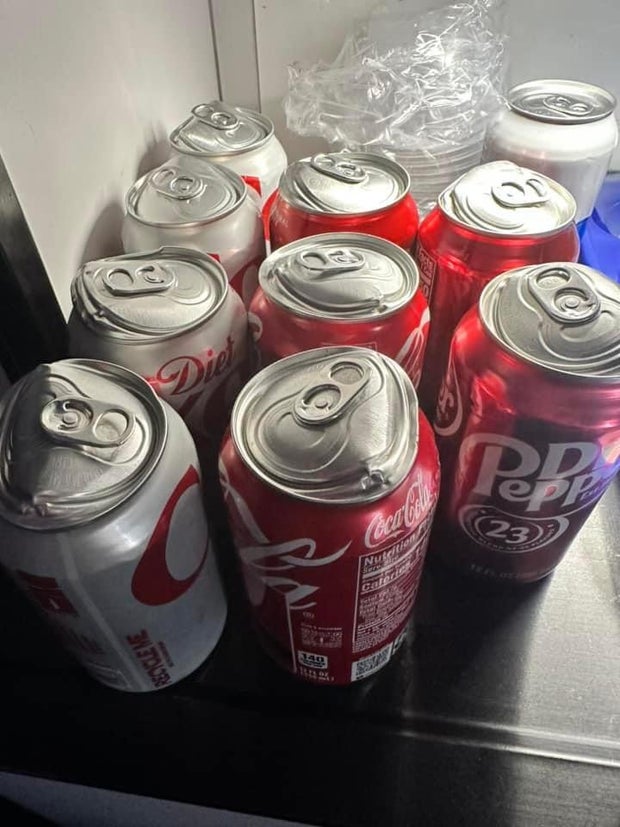The intense summer heat is causing soda cans to burst after being loaded on some Southwest Airlines flights, the airline confirmed to CBS News on Wednesday.
Airline officials say they are aware of a series of incidents where cans of carbonated drinks have ruptured, often while being opened, resulting in an onboard mess and reports of about 20 injuries to employees so far this summer.
There have been a few hand injuries reported by flight attendants because of the issue, including one that resulted in stitches. Southwest says the injury reports are similar to last year. The issue is generating more focus this year because it appears, at least anecdotally, to be occurring more frequently this summer.
Southwest Airlines officials say they are implementing measures to address the issue, including at several of its hotter provisioning locations such as Austin, Dallas, Houston, Phoenix, Las Vegas and Sacramento.
Chris Perry, a Southwest spokesperson, said the airline has been “communicating to our employees about it throughout the spring and summer.”
“We’ve developed a mitigation plan to address it,” Perry said.
The issue may have to do with how Southwest stores and loads drinks on planes in extreme heat. Unlike other airlines, Southwest does not stock perishables on board, so it is not required to use air-conditioned catering trucks to deliver meals and drinks to the aircraft. Instead, drinks on Southwest provisioning trucks are more frequently exposed to outside temperatures.
In an internal email obtained by CBS News from July 12 sent to flight attendants titled “Hot & Bursting Cans: Provisioning Procedural Changes,” company leaders said finding “viable solutions to bursting hot cans is our top priority.”
The message, from Rachel Loudermilk, managing director of base operations, and Matt Sampson, provisioning director, tells the airlines’ 21,000-plus flight attendants that “none of us are satisfied that we are still seeing reported events.”
The email lays out a series of changes Southwest has undertaken, especially in cities with hot temperatures, to address the problem since the beginning of the summer, including stocking fewer cans on provisioning trucks to limit the amount of time the cans spend on the flight line (and in the heat), placing carbonated drinks in coolers on trucks in hot weather locations, monitoring truck and can temperature with thermometers during shifts, and “not boarding product when the outside temperature reaches levels known to elevate the risk of bursting cans.”
The airline confirmed it has also told employees not to open cans that are noticeably hot to the touch or appear deformed due to heat exposure.
But the email adds that the airline has come to “recognize that additional immediate solutions are necessary” and are now considering making additional changes in Phoenix and Las Vegas, including halting the onboarding of cans with a temperature over 98 degrees (which would be checked with heat guns on the provision trucks). Non-alcoholic beverages that top 98 degrees would be returned to the warehouse to cool. The airline is also considering positioning refrigerated trailers at its warehouses to keep cans cool before they are loaded onto provisioning trucks to be brought to the flight line.
The email says Southwest began testing air-conditioned provisioning trucks this month and is having conversations with Coca-Cola to analyze the viability of the current cans and to consider alternatives, including a 7.5-ounce option. The airline currently stocks traditional 12-ounce soda cans.
As part of the testing in Arizona and Nevada, cans are being marked so they can be identified if they originated from refrigerated or non-refrigerated trucks.
Perry, the Southwest spokesperson, stressed that the airline is taking the issue seriously.
“We are investigating the issue and looking at changes to ensure safety for our employees and customers in the midst of extreme temperatures and climate change,” he said.
TWU Local 556, the union that represents Southwest Airlines flight attendants, did not respond to multiple requests for comment, but pictures of the burst cans are circulating online in postings to Facebook groups dedicated to Southwest employees. Many posts express frustration and concerns over safety. Some noted the cans that burst did not appear to be hot at the moment.
Southwest operates about 4,200 flights a day.
Kathryn Krupnik contributed reporting.




